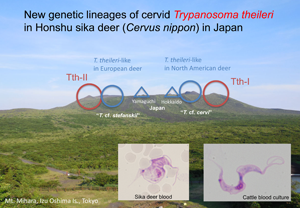Article contents
Genetic diversity of cervid Trypanosoma theileri in Honshu sika deer (Cervus nippon) in Japan
Published online by Cambridge University Press: 27 July 2021
Abstract

The taxonomy of ruminant Trypanosoma theileri and its relatives (Kinetoplastida: Trypanosomatidae) is controversial, with recent phylogenetic studies segregating T. theileri in cattle and other ruminants worldwide into two major genetic lineages (the TthI and TthII clades) based on genetic markers. In the present study, T. theileri-like trypanosomes isolated from Honshu sika deer (Cervus nippon) in the western Japan (YMG isolate) were genetically characterized using a number of genetic markers. Sika deer trypanosomes of the YMG isolate were genetically different from the Trypanosoma sp. TSD1 isolate previously recorded from Hokkaido sika deer in northern Japan, with the former trypanosome isolate being genetically closer to European cervid trypanosomes and the bovine T. theileri TthII lineage. In contrast, the latter isolate exhibited greater relatedness to North American cervid trypanosomes and the bovine T. theileri TthI lineage, although a clear genetic distinction between these was apparent. Furthermore, trypanosomes in Honshu sika deer from the central part of Japan harboured additional genetic diversity and were closer to either TSD1 or YMG isolates, while distinct from known T. theileri-related genotypes. Importantly, cervids and wild ruminants worldwide might harbour divergent descendants of a T. theileri ancestor, which exhibit rigid host specificity to either bovines or cervid species.
Keywords
- Type
- Research Article
- Information
- Copyright
- Copyright © The Author(s), 2021. Published by Cambridge University Press
Footnotes
These two authors contributed equally to this work.
References
- 6
- Cited by



